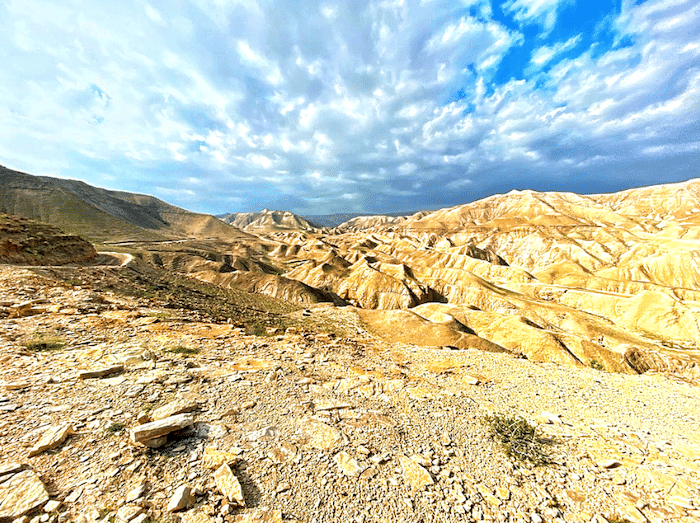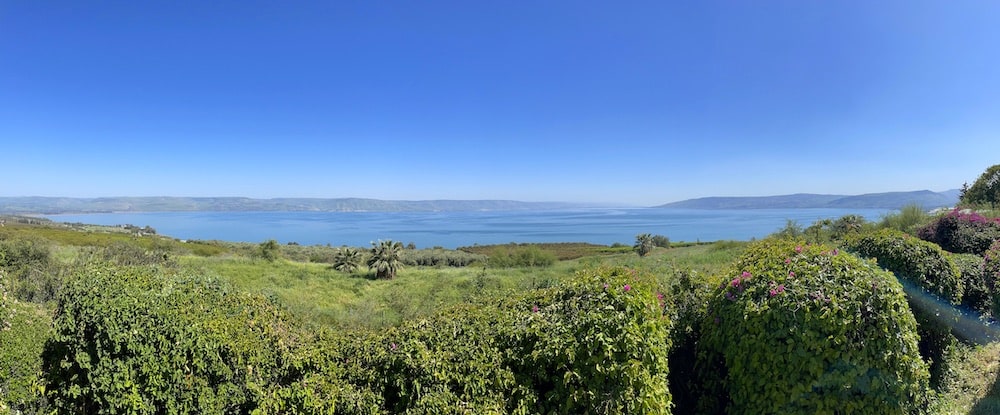“The deserts of the Middle East are in need of water, not bombers.”[1]
These were not the words of just a mother and a woman but of former Israeli Prime Minister Golda Meir.
The need for adequate water supplies and reserves has plagued Israel and her neighbors since the beginning of history. Although Israel is not technically a desert, it sits on the western edge of two dominant deserts: the Syrian Desert to the northeast and the Arabian Desert to the southeast. Plus, Israel shares the Dead Sea (which you can visit on our April 2024 tour!) with Jordan, making drinkable water scarce in the Middle East.
The Challenge of Low Rainfall Water
The problem with rainfall in Israel is the prevailing desert conditions mean a short rainy season from November until March (making about 70 percent of the average rainfall). Historically and geographically, the lack of perennial rivers and a limited number of aquifers throughout the land of Israel exacerbated the problem.
When the psalmist reflected upon his spiritual needs, he likened himself to a deer seeking water during the dry summer months: “As the deer pants for the water brooks, so my soul pants for You, O God. My soul thirsts for God, for the living God; when shall I come and appear before God?” (Psalm 42:1–2)

The Judean desert (photo by Amit Lahav on Unsplash).
Like ancient Israel, the modern State of Israel depends upon the winter rains. This factor has been constant in history.
Like the rest of the Middle East, Israel also faces increasing water shortages due to population growth and agricultural demands. Israel’s primary source of water has always been the Sea of Galilee. This natural lake has been shrinking at an alarming rate due to continued drought cycles, exponential population growth, and agricultural needs. Although the current water level is above the danger line, it has been remarkably low in recent years. In 2017, Amir Givati of Israel’s Water Authority said the situation was a grave concern. The Sea of Galilee had endured four consecutive years of limited rain. He reported, “The lake has fallen to its lowest level for a century.”[2]
Utilizing High Technology to Provide Fresh Water
Facing seemingly insurmountable shortages, the Israeli government decided to pursue desalination in 1999 as a strategy to address water scarcity.[3] Desalination is the process of using reverse osmosis technology to separate water molecules from seawater. With determination and all available resources, Israel mounted an intense effort to build affordable and efficient desalination processing plants on the Mediterranean Coast! Israeli scientists and engineers not only met the goal but exceeded all expectations.
The Sea of Galilee
For decades, Israel has also been an innovator and leader in water reclamation for use in agriculture. “The rate of reclamation in Israel is the world’s highest, mostly for agricultural use.”[4] The use of reclaimed water has enabled Israel to provide water for agriculture in Jordan and export large quantities of produce to Europe at an affordable and consistent rate.
Despite these remarkable achievements, the water level of the Sea of Galilee kept dropping to dangerously low levels. This posed a grim future for this freshwater lake and those who use it for fishing, agriculture, and leisure.

The Sea of Galilee
Israel had a solution to this dire situation: pumping the excess desalinated water into the Sea of Galilee. The project was approved, and the construction was completed. As of January 2023, water is being pumped into the Sea of Galilee with outstanding results.
Yoav Barkay, manager of the National Water Carrier, reports:
Israel is saving its main freshwater reservoir from the effects of climate change. The Sea of Galilee was being lost to droughts, so Israel built a chain of desalination plants along its Mediterranean coast. They turn seawater into freshwater, to refill the lake when water levels get low. [5]
The renewed water levels of the Sea of Galilee bring a peace incentive with Jordan. Israel and Jordan signed a memorandum of understanding (MOU) at the Egyptian resort of Sharm el-Sheikh.[6] The deal, initially brokered last November, will see Jordan build a solar plant with the capacity to export 600 megawatts of energy to Israel. In return, Israel will supply Jordan with 200 million cubic meters of desalinated water.
A Brighter Way to the Future?
The brilliant innovations and efforts of the Israeli government and its people have forged ahead in finding solutions to the historical and life-threatening need for water. However, critics and environmentalists raise a lot of questions about the long-term effect of desalinated water on the Mediterranean Sea and the rest of the environment:
While reliance on desalination may allow Israel to meet basic domestic and agricultural needs, doing so will have considerable environmental consequences:
-
- steep rise in energy demand > process and pumping Mediterranean Sea water
- effects on Israel coastal landscape and aquatic ecosystem
- irrigation concerns of desalination and recycled waters
- potential health concerns of the general population and animals [7]
It is often said the problems will be resolved with time and technology. Yet, there is a biblical perspective. In the book of Deuteronomy, Moses decreed:
It shall come about, if you listen obediently to my commandments which I am commanding you today, to love the Lord your God and to serve Him with all your heart and all your soul, that He will give the rain for your land in its season, the early and late rain, that you may gather in your grain and your new wine and your oil (Deuteronomy 11:13–14).
In the Bible, if the people of Israel were faithful to follow the Torah—the Law of Moses—the Lord God would provide the necessary resources for a fruitful and productive life. These blessings included peace on the borders, protection from pestilence, and sufficient rain in season.
The challenges facing Israel and the rest of the Middle East are not just about technology but also about faith and obedience as a nation. Modern science and ingenuity do not supersede the biblical mandate. The delicate balance holding together the Middle East is a call for the nations to turn to the Lord God and His Messiah, Jesus.
Would you join us in prayer for the people of Israel—and the world—to know and receive the Messiah as our true source of hope now and in the future?
Notes
Published on August 28, 2023.
Header photo by dozemode on Pixabay.
[1] Golda Meir, A Land of Our Own: An Oral Autobiography, ed. Marie Syrkin (Putnam, 1973), 118.
[2] “Sea of Galilee Water Level Lowest in Century,” Phys.org, March 7, 2017, https://phys.org/news/2017-03-sea-galilee-lowest-century.html.
[3] Isaac Kramer et al., “Effects of Population Growth on Israel’s Demand for Desalinated Water,” npj Clean Water 5, no. 1 (December 27, 2022): 67, https://doi.org/10.1038/s41545-022-00215-9.
[4] “Background—Seawater Desalination in Israel,” Ministry of Finance, January 26, 2021, https://www.gov.il/en/departments/general/project-water-desalination-background.
[5] “Israel Refills the Sea of Galilee, Supplying Jordan on the Way,” Reuters, January 30, 2023, https://www.yahoo.com/now/israel-refills-sea-galilee-supplying-215147564.html.
[6] Mohammad Ersan, “Jordan and Israel Sign US-Brokered Water-for-Energy Deal,” Middle East Eye, November 22, 2021, https://www.middleeasteye.net/news/israel-jordan-sign-uae-brokered-deal-to-swap-solar-energy-and-water.
[7] Kramer, et al., “Effects of Population Growth.”

